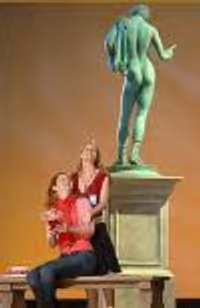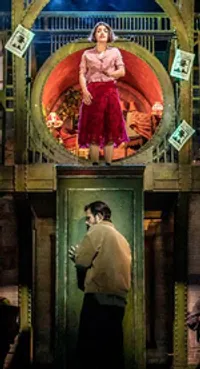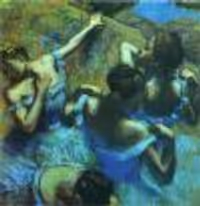RAGTIME is a good, flawed show **Spoilers**
#50re: RAGTIME is a good, flawed show **Spoilers**
Posted: 11/3/09 at 3:39pmThanks Ragtime Ray, I did not know that.
#50re: RAGTIME is a good, flawed show **Spoilers**
Posted: 11/3/09 at 3:39pmThanks Ragtime Ray, I did not know that.
#52re: RAGTIME is a good, flawed show **Spoilers**
Posted: 11/3/09 at 3:39pmThanks Ragtime Ray, I did not know that.
#53re: RAGTIME is a good, flawed show **Spoilers**
Posted: 11/3/09 at 4:00pm
Enchanted Hunter has raised some points that make me wonder about the staging in this production.
Coalhouse can't move his car. At least that's the way it is in the novel (and in the Milos Foreman movie, if you've seen it). The firemen cut him off, both in front of and behind the vehicle. He has no choice but to go for help on foot, because they block the road at both ends and refuse to move.
I haven't seen the revival's staging of this scene, but it seemed pretty clear to me in the original production --- or perhaps it was because I knew that's what was happening. I don't remember.
As far as Sarah being too stupid or uneducated to behave better and understand how to approach politicians, etc. I see Sarah as a victim of her time. She makes horribly poor choices, but she's not an evil person. I think "What Kind of Woman" helps us ask those questions right away. Who is the type of person who would do such a thing? There is a little more to her story in the book, but not much. Her plight is the catalyst that sets the rest of the story in motion. I don't need to know more about her, because her story really isn't the focus here.
When I first heard they were going to musicalize this novel, I thought they would never be able to pull it off. So much of the novel is exposition. It can cover several weeks of events, in detail, in just a few pages. There's a whole lotta plot going on. So how do you condense all of this for a stage musical ... or for a film? Most of it is done with characters stepping forward and talking about themselves and their situations in third-person. A contrivance? Sure. But a necessary one to advance such a huge story. I think it works well, but the problem is that it flies by the audience so quickly that the impact or even the information can escape them.
For those of you who have seen the Foreman movie, you know that's it's vastly different in form and focus from the musical. Much more time is spent with Younger Brother and Evelyn. You do get to see that he's got anarchy in his blood from the beginning. It's not just a situation of "well, I'm not gonna get the pretty and famous girl now, so I'd better go blow up buildings." Oh, sure his motivation with Evelyn is more lust at first, but he also swoops in to rescue her from the debauchery and hypocrisy all around her. All the while hypocritical himself.
There's also more time spent (in the film) with the relationship between Coalhouse and Father. I understood exactly why he called for Father to come negotiate his deal with the police. He was the only man left on the outside who Coalhouse trusted. Even if they didn't see eye to eye. And since Coalhouse spent so much time with this family trying to court Sarah, I don't see it as surprising to find both Young Brother and Father involved in these last scenes together, as if they were all randomly thrown together. Far from it. They were all connected in the same house together in New Rochelle for weeks leading up to these final events.
I think a lot of the problem(s) and/or confusions arise from trying to cover so much ground, with so many characters, in such a short amount of time. Holding and shifting focus successfully can be the key. It can also lead to a lot of the trouble people are talking about here if it doesn't quite work.
I still think "Ragtime" is one of the best musicals of the past quarter-century. Book, music, and lyrics. All of it. Perfect? No. I had other problems with it than the ones mentioned here. Primarily one too many "power ballads" toward the end of the show. I would have cut "Make Them Hear You" and had Coalhouse's final moments in the library as book-only. This is the point where the music in his life literally should run out for him. I would have done it with very little dialogue as well. Mostly silent with clear staging and lighting.
Still, all in all, I think it's a great show though.
blocked: logan2, Diamonds3, Hamilton22
Unknown User
Joined: 12/31/69
#54re: RAGTIME is a good, flawed show **Spoilers**
Posted: 11/3/09 at 4:17pm
"I still think "Ragtime" is one of the best musicals of the past quarter-century. Book, music, and lyrics. All of it. Perfect? No. "
Ragtime is one of the best musicals ever. There is no such thing as perfect. And if there was, some jackass would complain on here that it was too polished and needed some flaws.
Unknown User
Joined: 12/31/69
#55re: RAGTIME is a good, flawed show **Spoilers**
Posted: 11/3/09 at 4:22pmWait- on second thought, if they could add Aaron Tveit in his boxers, THEN it would be perfect.
#56re: RAGTIME is a good, flawed show **Spoilers**
Posted: 11/3/09 at 4:42pm
ok, how did 5 black guys (and one white guy)get into the JP Morgan Library? Come on, you don't have to be that clever..pretend to be a delivery crew, or janitorial, or construction...not that hard to believe.
The reason Father and Younger Brother change clothes is to help Younger Brother escape the law...if he left as one of them, he would stand out and be recognized, in Father's clothes he was to be mistaken as Father who was a hostage to allow their getaway...once Father actually comes out, they are all long gone, and nobody remembers what he looks like, since they were not looking at him anyway...hence it helps Younger Brother escape.
I don't want to seem too elitist, but anybody who did not understand this CAN blame the show, or the direction, or whatever, but they might want to look in the mirror at their own problems understanding what to me was pretty simple.
#57re: RAGTIME is a good, flawed show **Spoilers**
Posted: 11/3/09 at 4:45pm
It baffles me that some of you are so critical of the show and the "metaphors." There is one that is so obvious that it amazes me there are so many questions about it.
The reason why younger brother and coalhouse swap clothes is so younger brother can "get away" with the others. When Coalhouse demands the release of his "assistants" YB is in his own clothes while the black men are in trenches and such... YB swaps clothes so he can make his getaway without avoiding any suspicion and to be able be free.
---It amazes me how critical people can be of shows.... It also amazes me how some people can be so judgemental about those of us who find Ragtime to be a masterpiece. I have seen the show in NYC twice, on tour three times, and the kennedy center production. I understand that there is some questions with this show. But there are with ANY show. We consider South Pacific a classic and yet there are some major issues in the show. Show Boat, Oklahoma, Carousel.. all shows that have issues but are deamed classics. Maybe it s cause they are "old" or maybe it is cause we see the greater sum of its parts. ---
With that, maybe miracle elixer and others can get off their high horses and look at the show as a whole.
And I always say... those who can do, those you can't bitch about it on Braodwayworld.com.
*** changed it cause someone does not know how to spell....***
#58re: RAGTIME is a good, flawed show **Spoilers**
Posted: 11/3/09 at 4:51pm
JRybka, you might want to re-examine that last sentence of yours:
"And I always say... those you can do, those you can't bitch about it on Braodwayworld.com."
Updated On: 11/3/09 at 04:51 PM
#59re: RAGTIME is a good, flawed show **Spoilers**
Posted: 11/3/09 at 4:51pm
The reason why younger brother and coalhouse swap clothes is so younger brother can "get away" with the others. When Coalhouse demands the release of his "assistants" YB is in his own clothes while the black men are in trenches and such... YB swaps clothes so he can make his getaway without avoiding any suspicion and to be able be free.
Hmm, interesting, why don't I remember this happening? Oh wait, I know!! It's because Younger Brother switches clothes with Father, NOT Coalhouse. Have you SEEN the show? If not, I wouldn't recommend commenting on the plot line...
lovesclassics
Broadway Star Joined: 10/7/05
#60re: RAGTIME is a good, flawed show **Spoilers**
Posted: 11/3/09 at 4:52pm
best12bars,
I ALWAYS enjoy reading your posts. So insightful, so articulate, and so informative. Thank you.
I look forward to reading your thoughts on this production of Ragtime once you see it. It is one of my all-time favorite musicals - warts and all.
But it DEMANDS clear, balanced, and well-focused staging. Not to mention goosebump-inducing vocals and accessible performances.
I loved the Paper Mill production. It captured the power of the Broadway original in terms of musicality but offered genuine warmth and humanity to make the big themes resonate on a more personal level.
It seems that Marcia Milgrom Dodge is borrowing considerably from Stafford Arima in terms of concept for this revival. Kudos for seemingly pulling it off so successfully, but I'm very curious to see how it compares to Arima's version.
#61re: RAGTIME is a good, flawed show **Spoilers**
Posted: 11/3/09 at 4:56pm
loveclassics, I'm not sure if you have seen the present Broadway production, but having seen the Papermill production (which I hated) and the DC production numerous times, as well as the latest Broadway incarnation - it DOESN'T appear that Marcia Milgrom Dodge borrowed from Stafford Arima at all.
#62re: RAGTIME is a good, flawed show **Spoilers**
Posted: 11/3/09 at 4:58pm
BJH2114....
I apologize profusely on my mistake in the writing. I meant to say that father did that so brother could get way not coalhouse. Mea Culpa.
It always amazes me how rude people are on this blog. It is a musical not marriage equality or something....
#63re: RAGTIME is a good, flawed show **Spoilers**
Posted: 11/3/09 at 5:17pm
the line in the show when Coalhouse has Father give his clothes to Younger Brother (as Coalhouse's men prepare to leave) is something like:
"Here is your hostage. One white face looks pretty much like another."
I believe Bill Murray used the same trick in escaping from a bank robbery in the 1990 film Quick Change.
After Eight
Broadway Legend Joined: 6/5/09
#64re: RAGTIME is a good, flawed show **Spoilers**
Posted: 11/3/09 at 5:19pm
To JRybka:
What's baffling about people criticizing the "metaphors" if they don't find them theatrically viable?
And no one is being judgmental of those who find "Ragtime" a masterpiece. They just don't share that opinion. There's nothing judgmental about that.
And it strikes me that it is not Miracle Elixir and others who criticize the show's flaws that are on their high horse, but those who get all hot and bothered by reading valid criticism.
"It amazes me how rude people are on this blog."
I'm sorry to say your posts fall in this category.
I would say don't be so touchy about what other people think. If you think "Ragtime" is a masterpiece, then say so, and enjoy it. Let other people who disagree disagree without a tirade.
I personally love "South Pacific" and "Oklahoma." If other people say they stink, well, frankly, I couldn't care less.
lovesclassics
Broadway Star Joined: 10/7/05
#65re: RAGTIME is a good, flawed show **Spoilers**
Posted: 11/3/09 at 5:26pm
Hi, Dottie,
I haven't seen this revival yet. That's why I'm so curious. Can you elaborate on the differences? Thanks much. ![]()
#66re: RAGTIME is a good, flawed show **Spoilers**
Posted: 11/3/09 at 5:47pm
"The 'message' of his subplot is irritating too. He comes hopefully to the land of opportunity, then comes to hate it when he sees the reality, then the American Dream is vindicated because he happens to get lucky?"
I wanted to quibble with this a bit, as well.
Tateh does not happen "to get lucky." He succeeds through perseverence, hard work, cleverness and creativity. THAT is the American Dream. Calling it "lucky," suggests a very different worldview.
#67re: RAGTIME is a good, flawed show **Spoilers**
Posted: 11/3/09 at 5:55pm
I liked JRybka's original final sentence, of their little rant, better than the edited version.
"those you can do, those you can't bitch about it on broadwayworld.com" -- Nice. I like. I like a lot.
We'll leave it at that.
#68re: RAGTIME is a good, flawed show **Spoilers**
Posted: 11/5/09 at 3:03am
"The 'message' of his subplot is irritating too. He comes hopefully to the land of opportunity, then comes to hate it when he sees the reality, then the American Dream is vindicated because he happens to get lucky?"
"I wanted to quibble with this a bit, as well.
Tateh does not happen "to get lucky." He succeeds through perseverence, hard work, cleverness and creativity. THAT is the American Dream. Calling it "lucky," suggests a very different worldview."
I shall counter-quibble :) I agree that Tateh is hardworking, persevering, creative etc. However, it seems that the other struggling immigrants around him try just as hard; what distinguishes him from them is more luck, not greater deservingness. Believing that Tateh is lucky is, IMO, better than the alternative, ie that the other suffering workers should just try harder and they'll be as successful as he is. But either way, the others' stories are conveniently ignored once Tateh gets his break, and his story is held up as The Story.
#69re: RAGTIME is a good, flawed show **Spoilers**
Posted: 11/5/09 at 9:18amAs if immigrants who would go on to be wildly successful had no luck behind their success? Of course something major happens to him, he's a Main Character and therefore something major has to happen to him or else we wouldn't care. His journey is the exact opposite of Coalhouse's, showing that the American Dream isn't absolute and actually fairly precarious- and it doesn't matter who accomplishes it.
#70re: RAGTIME is a good, flawed show **Spoilers**
Posted: 11/5/09 at 12:35pm
Enchanted Hunter has raised some points that make me wonder about the staging in this production.
I wonder whether Enchanted Hunter has seen the production or is just raving about the original, because all their complaints come from just the material, with no details from the production.
Then again, after years of reading The Enchanted Hunter's posts, I tend to take anything said with a grain of salt.
Wanting life but never knowing how
#71re: RAGTIME is a good, flawed show **Spoilers**
Posted: 11/5/09 at 12:41pm
The difference between Coalhouse and Tateh is fascinating, in the musical, the film, and in the original source material.
Both men are victims of their own circumstances, most of them horrible. Both are faced with dire situations, and both react in very different ways. Both also want to embrace and pursue the American Dream. I don't believe that luck has anything to do with the outcome, though.
It wasn't luck that led to Tateh's success. And it wasn't just hard work either. It was his ability to see a golden opportunity and seize it. There's no luck involved in that. He was a visionary. I'm sure others made flip books first. He didn't "invent" them. He just saw their extraordinary potential as a marketable commodity. He also saw how he could parlay his books into something even greater: motion pictures.
Coalhouse is equally talented as a musician, but his situation is different. He is caught in a "war of principles," and refuses to walk away from it. That's not "luck" either. That's his choice. And right or wrong, he pays dearly for it.
Things could have worked out differently for both of them, by their own hand. If their personalities were different, Tateh might have just sold his one flip book, celebrated with some extra cash in his pocket and moved on to a job in a factory or assembly line.
If Coalhouse had walked away from being humiliated by those firemen, he might have lived to be a great musician. Sarah might have lived as well.
Neither men could have done this, because that's not "who they were" as people.
"Luck," however, is for Vegas. Nobody rolled any dice and came out a big winner or a loser from an isolated incident here.
blocked: logan2, Diamonds3, Hamilton22
Roscoe
Broadway Legend Joined: 5/15/03
#72re: RAGTIME is a good, flawed show **Spoilers**
Posted: 11/5/09 at 2:57pmIt has been a while since I read Doctorow's novel. How much detail does he really supply about Tateh's rise from flipbook creator to film mogul?
#73re: RAGTIME is a good, flawed show **Spoilers**
Posted: 11/5/09 at 3:20pm
It's been a long time since I've read it, Roscoe. Maybe 15 years. But I recall that Tateh starts acting like a movie mogul before he gets there. He wants to forget his poor immigrant roots as quickly as possible so he reinvents himself completely.
In the play (but especially in the movie), we just jump ahead to his success, not seeing as much of the price he paid for getting there. Mostly by losing his identity entirely in order to gain a "better" one.
blocked: logan2, Diamonds3, Hamilton22
#74re: RAGTIME is a good, flawed show **Spoilers**
Posted: 11/5/09 at 3:32pm
I would just like to thank TheEnchantedHunter and best12bars for one of the most thoughtful, intelligent and riveting discussions I've seen on this board in a LONG while. TRULY fascinating!
Bravissimo, gentlemen! Keep it up!
Some grist for the mill: is Mother truly the "lead", or at least the crux of the drama, and does that character have the most complete journey taken by any of the characters? Why? Why not?
P
Videos











